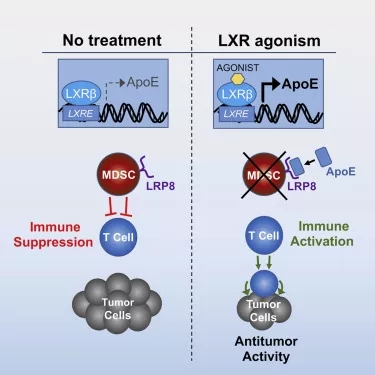Cell: New immunotherapy can treat a variety of cancers, clinical trials are initially successful
January 17, 2018 Source: Biological Exploration of: Chen
Window._bd_share_config={ "common":{ "bdSnsKey":{ },"bdText":"","bdMini":"2","bdMiniList":false,"bdPic":"","bdStyle":" 0","bdSize":"16"},"share":{ }};with(document)0[(getElementsByTagName('head')[0]||body).appendChild(createElement('script')) .src='http://bdimg.share.baidu.com/static/api/js/share.js?v=89860593.js?cdnversion='+~(-new Date()/36e5)];Editor's note
At the beginning of the new year, cancer immunotherapy breaks through! After two days before Science uncovered the key reasons why such treatments were ineffective for most people, Cell made another important development! In the study, scientists have found new immunotherapies that can fight multiple cancers in mice, and have achieved initial success in clinical trials!

Image source: Network
In recent years, when it comes to cancer, few treatments are more exciting than immunotherapy. This type of disruptive therapy uses the patient's own immune system to detect and kill cancer cells and has been proven to treat more than a dozen different cancers. However, at present, immunotherapy still has a lot of limitations. It can only be used to treat a small number of patients. In most cases, it is still ineffective. This is because cancer cells are very "squeaky" and they have many ways to protect themselves. Protect from immune attacks.
In a study published online in Cell on January 11, a team of scientists from Rockefeller University reported a way to disrupt the protective barrier of cancer, making it easier for immune cells to do their job— Kill cancer cells.

Image source: Cell (DOI: http://dx.doi.org/10.1016/j.cell.2017.12.026)
In particular, this new approach focuses on an immune cell called myeloid-derived suppressor cells (MDSCs) and appears to have the ability to fight a variety of different cancer types in mice.
"The previous study found that MDSCs can prevent other types of immune cells (such as T cells, natural killer cells) from targeting cancer. Therefore, we predict that if you can find a way to kill MDSCs," said Sohail Tavazoie, co-author of the paper. It may activate a beneficial anti-cancer immune response."

Sohail Tavazoie (Source: Rockefeller University)
â–‹ 1 , activate the "double effect" of the ApoE gene
In an earlier study, Tavazoie's lab investigated a gene called ApoE and its role in "inhibiting the transfer of melanoma from the primary site to other organs." They found that increasing ApoE leads to a reduction in tumor metastasis by "injuring cancer cells' ability to invade healthy tissues and grow blood vessels."
More interestingly, the researchers found that in addition to anti-metastasis, the ApoE-producing drug seems to activate anti-tumor T cells by reducing the MDSC levels in mice to affect the immune response.
"These results suggest that activation of the ApoE pathway enhances the immune response against cancer," said Masoud Tavazoie, lead author and co-corresponding author.

Image source: Cell
â–‹ 2 , clinical trials showed initial success
In a recent experiment, scientists treated mice of different cancer types with a compound called RGX-104. The role of RGX-104 is to induce the production of ApoE in the body. The results show that the compound is effective against a variety of tumor types, especially lung cancer, kidney cancer, ovarian cancer, breast cancer, and melanoma and glioblastoma. At the same time, studies have confirmed that RGX-104 kills mouse MDSCs, which allows other immune cells to attack cancer.
Currently, researchers are testing RGX-104 in a multicenter Phase I clinical trial involving multiple types of cancer patients. In addition to assessing the potential as a single drug, the researchers are investigating the efficacy of RGX-104 combined with immunotherapeutic PD-1 inhibitors. This Cell paper reports the early results of this clinical trial, which included a total of six patients. The results showed that the number of MDSCs was reduced in patients receiving RGX-104 treatment, and the immune response was increased.
Sohail Tavazoie said: "This is the first time we have pushed the work of the laboratory into clinical trials. We are very pleased to see that in all the patients tested so far, the way the drug affects the immune system is in our mice. The observed is similar."
It is reported that the researchers plan to eventually recruit 120 patients for the clinical trial and expect to report more results later next year.
References: 1) New immunotherapy approach boosts body's ability to destroy cancer cells
Cosmetic manufacturing materials
We supply products have Cosmetic manufacturing materials,Avobenzone Pregnancy,Adapalene and Vitamin C,Adapalene and Benzoyl Peroxide,Horse Chestnut Seed Extract,
China Cosmetic Product,Custom Kojic Acid Powder supplier & manufacturer, offer low price, high quality Lactic Acid Powder,Allatoin Powder Active Ingredients, etc.
Now we have 3 GMP standard workshop, Meanwhile, the factory is equipped with the researching and quality inspection centre, with strong technology research and development strength. We also have 3 salesdepartments over 30 people and sell our products all over the world.
For customer`s needs, OEM service is also acceptable. If you have a good idea in new product production but lack of laboratory device and human resource, we are glad to solve this problem for you. Sincerely hope to strengthen exchanges and cooperation with friends from both home and abroad.
Cosmetic manufacturing materials,Avobenzone Pregnancy,Adapalene and Vitamin C,Adapalene and Benzoyl Peroxide,Horse Chestnut Seed Extract
Xi'an Henrikang Biotech Co.,Ltd , https://www.xianhenrikangbio.com